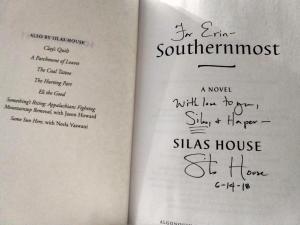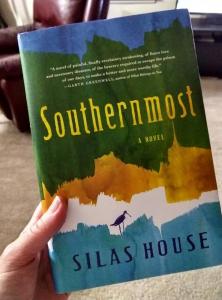I’m on vacation this week and most of next. That doesn’t mean I’m not writing. It does mean I’m writing what I want, and not what the zeitgeist demands.
I’m home visiting family, and also on what has become a mini-book tour. Come see me in Bowling Green, Nashville or Lexington, KY this week!
You’ll notice that itinerary doesn’t include home home, which is London, Kentucky. I don’t make it there often, mostly because it adds a couple extra hours of driving to what is already a LONG damn road trip from Kansas City. It’s fine because my mom is coming to see us at my brother’s in Nashville.
It’s also fine because, in a lot of ways, I feel like I’ve already been down-home this summer. Because I read Silas House’s new novel, Southernmost. And anything by SH is as good as a trip home.
As a side note, I am keeping my commitment to the authors-of-color reading list. I read We Were 8 Years in Power, by Ta Nehishi Coates; and am well into Americanah. But here’s what happened: Two of my church folks were traveling and came across Silas House signing books at a local bookstore in Asheville, NC. They proceeded to tell him about their crazy pastor (that would be me) who named her kids after favorite authors—including him. And they had him sign a book for me, with an inscription to my kids. Then they came home and put that book in my hands.

I had to read that book now, rather than later.
In brief review: Southernmost is the story of a fundamentalist pastor in Appalachia who has a come-to-Jesus moment with a gay neighbor. He then preaches a mildly LGBT-affirming sermon (I mean, in the tamest possible “don’t judge your neighbor” kind of way), and predictably, gets run out of town on a rail. I don’t want to give away too much, but he ultimately winds up on the run–set out to find his long-lost gay brother, who we learn he hasn’t spoken to in over a decade.
I loved this book for many reasons: for all the ways it rings true in an ideologically divided America, in a time when the Christian narrative itself seems so tenuous and at-odds in itself; I love how it brings real-seeming people to life and makes you love them, and care about what happens to them.
But, mostly I love it because–like everything he writes—it takes me home.

Not only is Silas House from the same end of the state as me—he’s even from the same county. The same holler. And, not for nothing, that ain’t a big place. It’s not like there’s a long list of authors from that corner of the world who can write with just that voice, and just that particular echo of geographical truth and authenticity. It almost doesn’t matter that this particular story starts in western Tennessee, rather than eastern Kentucky. When it comes to voice and place, the holler is the holler. In reality, and on the page, it’s a place where people are loving and genuine, hard-working and good … and also deeply fearful of anything “other” or “elsewhere.”
That’s the tension that makes this story sing. And it’s also the tension that defines any trip home, for those of us who leave. Wherever “home” may be.
It’s a tension that means, on the one hand, you grow up feeling suffocated by the hills; only to find, in seeing the world, that flat land feels harsh and empty and just wrong.
It means you can lament the fear of other that sometimes dominates the culture of your home town—but at the same time, you get Mama-Bear-level-pissed when Hillbilly Elegy hits the bestseller list, perpetuating Appalachian stereotypes that already dominate the region’s portrayal in popular culture.
It means you love your place and your people, holding deep affection and gratitude for what they made of you; but you also wish they would FFS quit voting against their own interests just because a demagogue rich guy pretends to care about coal country. Or to even know what “coal country” is.
It means hanging onto your accent for dear life, no matter where you go; and then crying into your bourbon when Loretta Lynn endorses Donald Trump from the stage.
Do we love her anyway? You bet. Does it make me want to move home again? Not exactly.
Being a Kentuckian in diaspora means you live the rest of your life in the tension between longing for home; and the slightly breathless sense of having outrun something. Just barely.
Can I be critical of the place that raised me but also be ready to throw down if you make fun of hillbillies like you’re somehow better than my people? Betch’yer yankee ass I can.
Do I recognize the problematic nature of insular community and backward thinking, while also knowing it doesn’t entirely define a place on the whole, or apply to every single person who lives there? Yeah, that too.
It’s complicated.
So is life. So are people. Even if you’re not from my holler, most of us live with some version of that sacred struggle between where we come from and where we are. Here is my summer wandering advice to you: wherever you come from, find an author (or maybe several) who can take you home again. Someone who knows the landscape and the people who populate it, and can capture the nuances of real lived experience there, complete with all its beauty and brokenness. Step into the tension between where you were and who you are … and maybe remember that there’s not so much space between the two, no matter how far you’ve run.
Southernmost is an authentic trip from holler to “elsewhere” and back again. And, as protagonist Asher Sharp notes at one point: an exploration of “what passes for home” in the meantime.
There’s not a displaced Kentuckian alive who doesn’t feel that one in their bones.













